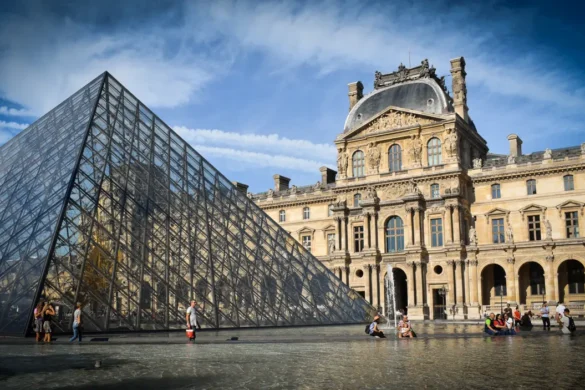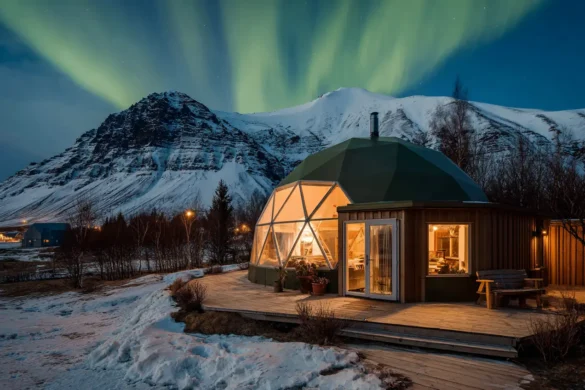Dreaming of Europe but don’t want to break the bank? You’re in luck! Europe is packed with incredible destinations that deliver big experiences on a budget. Over the years, I’ve explored this continent inside and out, visiting 40 European countries. As such, I’ve uncovered tons of cheap yet breathtaking spots.
In this guide to 13 amazingly cheap vacations in Europe for 2025, I’ve included destinations that offer epic adventures, delicious food, and unforgettable culture. Whether it’s soaking up history in Eastern Europe, lounging on Mediterranean beaches, or exploring charming small towns, these places are perfect for budget travelers.
Cheap European Vacation Spots to Visit
Are you ready to uncover the most affordable and beautiful vacation spots in Europe? This guide is your passport to not only the continent’s renowned budget-friendly destinations but also its charming hidden spots. Let’s set off on this journey of affordable marvels awaiting you across Europe.

1. Albanian Coast
Albania‘s coast is honestly one of the best deals in Europe right now, but let me be real with you – it’s not as dirt cheap as it was a few years ago. I spent two weeks exploring the Albanian Riviera in 2024, and while prices have definitely crept up, you’re still looking at way better value than Greece or Croatia.
Ksamil is the Instagram-famous spot everyone talks about, but here’s the thing – those gorgeous white sand beaches aren’t actually free anymore. You’ll pay €20-25 for sunbeds and umbrellas because all the beaches are privately owned. It’s pretty touristy in summer, but I can’t deny the water is absolutely stunning. If you want something more chill, Himare up the coast has a much more local vibe and cheaper prices.
Sarande is where I’d actually recommend staying. It’s got better restaurant options (that crab pasta for €9 was incredible), cheaper accommodation starting around €30-40 per night, and the nightlife is surprisingly fun. Plus you can easily day-trip to Ksamil or explore the ancient ruins at Butrint for just €10 entry.
The best time to visit is definitely May-June or September when the crowds thin out but the weather’s still perfect. Just bring cash – most places still prefer Albanian Lek, though euros work too.
- Read next: Albania Itinerary for First-Time Visitors
- You may also like: Prettiest Places in the Mediterranean

2. Sarajevo, Bosnia-Herzegovina
Sarajevo is hands down one of Europe’s most underrated cities, and your money goes ridiculously far here. I’m talking €8 for a massive plate of cevapcici, €2 beers, and accommodation starting around €20-30 per night. It’s honestly shocking how affordable everything is.
The Baščaršija old bazaar is where you’ll spend most of your time, and it’s totally free to wander around. The mix of Ottoman and Austro-Hungarian architecture is pretty incredible, and the coffee culture here is serious business – you’ve got to try the traditional Bosnian coffee ritual. The War Museum and Tunnel of Hope are must-sees if you’re into history, though they can be heavy.
What surprised me most was the nightlife scene. There are tons of quirky bars and clubs where you can drink all night without spending more than €20. The people are incredibly welcoming too – I had random locals buying me drinks and showing me around the city.
Getting around is super easy on foot, and public transport is just 2 BAM (about €1) per ride. The trams and trolleybuses will get you anywhere you need to go. If you’re flying in, budget around €15-20 for a bus or taxi from the airport to the city center. Just be aware that English isn’t as widely spoken as in Western Europe, but people are patient and helpful.
- Read next: Beautiful Places in Bosnia and Herzegovina

3. Bansko, Bulgaria
Let me tell you something – Bansko is probably the best ski deal in all of Europe right now. While everyone’s dropping €60+ per day on lift tickets in the Alps, you’re paying around €40 here for access to 75km of slopes. I’ve skied both, and honestly, the snow quality in Bansko is just as good.
The skiing runs from December to April, and you’ve got everything from gentle green runs perfect for beginners to some seriously challenging black diamonds. The gondola opens at 8:30am, and if you get there early, you’ll skip the worst of the crowds. Pro tip: the lines get brutal after 10am during February school holidays, so beat the rush.
Accommodation is where you’ll really save money. I stayed at Apart Hotel Dream for under €100 per night right next to the gondola station, breakfast included. If you’re on a tighter budget, there are hostels starting around €15 per night, which is mental when you compare it to St. Moritz or Chamonix.
The old town has serious charm with cobblestone streets and traditional taverns serving hearty Bulgarian food for €5-8 per meal. In summer, Bansko transforms into a hiking paradise with the Pirin Mountains right there. Equipment rental is super cheap too – expect to pay €65-105 for a week of ski gear, which would cost double that in Western ski resorts.
✈️ My #1 Hack for Cheap 2026 Flights:
It’s January, so flight prices are climbing fast—but you don't have to pay them. I’m currently seeing roundtrips to Europe for under $300 (deals you won’t find on Google Flights).
Step 1: Join Going.com's Free Plan here. It takes 10 seconds and requires no credit card.
Step 2: If you're doing a big trip this year, grab the 14-day free trial of Premium. You can even use my code JON25 for 25% off.
Seriously, this is the single best money-saving tool I’ve used in 8+ years.
👉 Send me cheap 2026 flights- Read next: Beautiful Places in Bulgaria

4. Czechia (Czech Republic)
Prague is obviously the main draw, but don’t sleep on the rest of Czechia – the beer alone makes this country worth visiting. I’m not kidding when I say you can get excellent Pilsner for €1-2 at local pubs, and it’s way better than what you’re paying €6 for back home.
Prague itself is still relatively affordable despite being touristy. Sure, the Charles Bridge area will hit your wallet harder, but step away from the main tourist zones and you’ll find amazing meals for €5-8. The Prague Castle costs around €15 to enter, but honestly, just walking around the Old Town and Lesser Town is free entertainment that’ll keep you busy for days.
I actually loved Plzeň even more than Prague – it’s the birthplace of Pilsner beer, and the Pilsner Urquell Brewery tour is only €10 and includes tastings. Olomouc is another hidden gem with stunning baroque architecture and way fewer crowds. And my personal favorite Czech town is Cesky Krumlov (read to find out why).
For a unique experience, skip the crowded Prague Castle and head to Vyšehrad fortress instead. The views of the Vltava River are just as good, entry is cheaper, and you won’t be fighting through tour groups for photos. Accommodation in Prague ranges from €25 hostels to €60 mid-range hotels, while smaller cities are even cheaper.
- Read next: ETIAS Launch Postponed to 2025

5. Estonia’s Baltic Coast
Estonia’s Baltic Coast is seriously underrated, especially if you’re into nature and don’t mind cooler weather. Lahemaa National Park is just an hour from Tallinn and costs nothing to explore – you’ve got hiking trails, rugged beaches, and these charming fishing villages that feel totally untouched by mass tourism.
Saaremaa island is where I’d recommend spending most of your time. The ferry costs around €15-20 per person, and once you’re there, accommodation is super affordable. I found spa resorts starting at €40-50 per night, which would cost triple that in Iceland or Norway. The island has this laid-back vibe with pine forests and medieval castles.
The best time to visit is definitely May through September when the weather’s decent and everything’s open. Sure, it’s not Mediterranean beach weather, but there’s something magical about those long summer days and the incredibly clean air.
What makes this area special is how uncrowded it feels. Even in peak summer, you’ll have beaches and hiking trails mostly to yourself. The spa culture is big here too – natural mud treatments and mineral baths that don’t cost a fortune. Plus, Estonia uses the euro, so no currency hassles for most European travelers.
- Read next: Beautiful Places in Estonia
- You may also like: Amazing Islands in Europe

6. Leipzig, Germany
Leipzig is honestly Germany‘s best-kept secret, and it’s way more affordable than Berlin or Munich. I spent a long weekend here and was blown away by how much culture you get for your money. The St. Thomas Church where Bach worked is free to visit, and hearing a concert there costs just €10-15.
The Spinnerei art complex in an old cotton mill is incredible – dozens of galleries and artist studios in this massive industrial space. Entry is mostly free, and the contemporary art scene here rivals Berlin without the pretentious prices. The whole city has this creative energy that’s hard to find elsewhere.
Leipzig’s nightlife is seriously underrated. The bars in the Südvorstadt area are quirky and cheap – craft beers for €3-4, cocktails under €8. I stumbled into this underground club in a former bunker that was unlike anything I’ve experienced.
Getting around is easy with trams and buses for €2.80 per ride, though the city center is totally walkable. You can rent bikes everywhere for around €10 per day. Clara-Zetkin Park is perfect for picnics and people-watching, and paddling the Karl-Heine-Kanal costs about €15 per hour. Accommodation ranges from €25 hostels to €70 boutique hotels, which is a steal for a major German city.
- Read next: Places to Live in Germany

7. Budapest, Hungary
Budapest is where your money stretches the furthest in Europe – I’m talking three-course dinners for €10-15, Széchenyi Thermal Baths entry for €20, and accommodation starting around €20 per night. It’s honestly ridiculous how much value you get here.
The thermal baths are obviously a must-do, but don’t just hit Széchenyi – Rudas Baths has this amazing rooftop pool with Danube views for about the same price. The ruin bars in the Jewish Quarter are legendary too. Szimpla Kert might be touristy now, but a beer still costs under €3, and the atmosphere is unbeatable.
I spent hours just walking between Buda and Pest sides of the city – the Chain Bridge and Parliament views never get old, and it’s all free. The Great Market Hall is perfect for cheap lunch and souvenir shopping. Traditional Hungarian dishes like goulash and schnitzel cost €5-8 at local restaurants.
Public transport is super efficient with day passes for €5 covering metros, trams, and buses. The Danube evening cruises start around €12-15, which is way cheaper than similar tours in Paris or Amsterdam. Pro tip: many museums are free on certain days for EU citizens, so check the schedules. Night trams run until 2am, so you can explore the illuminated city without expensive taxis.
- Read next: Beautiful Places in Hungary

8. Palermo, Sicily, Italy
Palermo gives you all the Italian charm without the tourist-trap pricing of Rome or Florence. Street food here is incredible and dirt cheap – arancini for €1-2, panelle (chickpea fritters) for under €3. I ate amazing food every day for less than €15 total.
The Ballarò and Vucciria markets are sensory overload in the best way – fresh seafood, colorful produce, and locals hawking everything imaginable. The Norman Palace and Palermo Cathedral are architectural stunners for just €8-12 entry fees. The Capuchin Catacombs are genuinely creepy but fascinating for €3.
Mondello Beach is a 30-minute bus ride (€1.40) from the city center and has crystal-clear water that rivals the French Riviera. The nightlife around Vucciria is lively but affordable – cocktails for €5-6, local wine for €2-3 per glass.
What I loved most was how authentic everything feels. This isn’t sanitized tourist Italy – it’s real, gritty, and full of character. Sure, some areas look run-down, but that’s part of the charm. Accommodation ranges from €25 hostels to €60 mid-range hotels. The only downside is that public transport can be unreliable, but everything in the historic center is walkable anyway.
- Read next: Breathtaking Places in Sicily

9. Lake Ohrid, North Macedonia
Lake Ohrid is probably the most beautiful place in the Balkans that nobody talks about. This UNESCO site has been around for millions of years, and the town of Ohrid feels like stepping back in time. Accommodation here starts at €20-25 per night for decent guesthouses with lake views.
I took a boat to the Monastery of Saint Naum near the Albanian border for €15, and it was hands down one of the most peaceful places I’ve ever been. The monastery sits right on the lake with mountains all around – it’s postcard perfect without the crowds you’d get at similar spots in Greece or Croatia.
The old town has churches and traditional architecture everywhere, plus this great pedestrian street lined with cafes and restaurants. Fresh trout from the lake costs €6-8, and local wine is under €10 per bottle. The Samoil Fortress offers incredible sunset views for just €2 entry.
Swimming in Lake Ohrid feels almost mystical – the water is incredibly clear and has this unique ecosystem you won’t find anywhere else. Boat rentals are about €20-30 per day if you want to explore the remote parts of the lake. The whole area has this timeless quality where you can completely disconnect from the modern world without breaking your budget.
- Read next: Best Historic Sites in the World

10. Kotor, Montenegro
Kotor sits in this dramatic bay surrounded by mountains that look like fjords – it’s honestly one of the most stunning settings in Europe. The UNESCO old town is a maze of medieval streets that’s completely free to explore, though climbing the fortress walls costs €8 and is worth every cent for the views.
The Blue Cave and Our Lady of the Rocks boat tour is a must-do for about €15-20. The cave has this incredible blue glow from underwater light, and the artificial island with the tiny church is fascinating. I did the tour in shoulder season and practically had both places to myself.
Accommodation is surprisingly reasonable – I found boutique guesthouses for €30-40 per night, even in summer. The restaurants along the marina serve fresh seafood for €8-12, though stick to places where locals eat to avoid tourist pricing. Kotor also has some great hiking trails if you want to escape the old town crowds.
The Adriatic Highway connecting Kotor to other coastal towns is one of the most scenic drives in Europe. Buses to Budva cost around €3 and take 30 minutes through incredible mountain and sea views. Just be aware that summer gets really crowded with cruise ship passengers, so early morning or late afternoon are the best times to enjoy the old town in peace.
- Read next: Stunning Places in Montenegro

11. Gdańsk, Poland
Gdańsk completely surprised me – this city has serious historical weight but also gorgeous architecture and beach access. The Main Town with its colorful merchant houses looks like something from a fairy tale, and just wandering around costs nothing. Neptune’s Fountain and Long Market are the Instagram spots, but the whole area is photogenic.
Sopot is just 20 minutes away by train (€2) and has Europe’s longest wooden pier plus great beaches. It’s got this retro resort town vibe that’s perfect for a day trip. The train ride along the coast is scenic too, passing through Gdynia which has some interesting maritime museums.
The European Solidarity Centre is essential if you’re into modern history – €8 gets you hours of exhibits about the fall of communism. The Crane (medieval port crane) is pretty cool for €5, though honestly the best views are from walking the old town walls for free.
Food here is fantastic and cheap – pierogi for €3-4, traditional Polish meals for €6-8. Beer is ridiculously affordable at €1.50-2 in local pubs. Accommodation ranges from €20 hostels to €50 mid-range hotels. The Amber Museum is worth seeing since Gdańsk is famous for amber jewelry – you’ll find cheaper pieces here than anywhere else in Europe.
- Read next: Beautiful Places in Poland

12. Porto, Portugal
Porto has all the charm of Lisbon but costs about 30% less for everything. The Ribeira district along the Douro River is where you’ll spend most of your time – colorful houses, port wine cellars, and that famous Dom Luís I Bridge. Crossing the bridge on foot is free and gives you incredible city views.

Port wine tastings in Vila Nova de Gaia start around €10-15 and include multiple samples at historic cellars like Sandeman or Taylor’s. The São Bento Station has stunning azulejo tile work that’s free to admire – seriously some of the most beautiful train station art I’ve seen anywhere.
You absolutely have to try a Francesinha sandwich – it’s this insane creation with steak, ham, sausage, and melted cheese covered in spicy tomato sauce. It costs €8-10 and is basically a meal for the entire day. The food scene here is incredible for the price.
Livraria Lello bookstore inspired Harry Potter but charges €5 entry now due to crowds – honestly, just admiring the exterior is enough. Better to spend your money on a Douro Valley day trip (€35) to see terraced vineyards and taste wine where it’s actually made. Accommodation ranges from €25 hostels to €60 boutique hotels, and the city’s compact enough to walk everywhere.
- Read next: Unique Things to Do in Porto

Global Viewpoint is a personal blog. All content is for informational and entertainment purposes only and does not constitute professional financial, medical, or legal advice.





